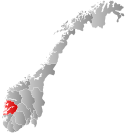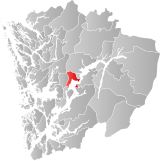Strandebarm is a former municipality in the old Hordaland county, Norway. The original municipality was large, spanning both sides of the central part of the Hardangerfjorden. It also included the island of Varaldsøy. Over time, the municipality was divided and by the time of its dissolution in 1965, it was 112 square kilometres (43 sq mi). The municipality included land in the present-day municipalities of Ullensvang, Kvam, and Kvinnherad. The administrative center of the municipality was the village of Bru, where Strandebarm Church is located.[3]
Strandebarm Municipality
Strandebarm herad | |
|---|---|
 Hordaland within Norway | |
 Strandebarm within Hordaland | |
| Coordinates: 60°17′N 06°01′E / 60.283°N 6.017°E | |
| Country | Norway |
| County | Hordaland |
| District | Hardanger |
| Established | 1 Jan 1838 |
| • Created as | Formannskapsdistrikt |
| Disestablished | 1 Jan 1965 |
| • Succeeded by | Kvam and Jondal municipalities |
| Administrative centre | Bru |
| Area (upon dissolution) | |
• Total | 112 km2 (43 sq mi) |
| Population (1964) | |
• Total | 1,628 |
| • Density | 15/km2 (38/sq mi) |
| Demonyms | Strandberming Strandeberming[1] |
| Time zone | UTC+01:00 (CET) |
| • Summer (DST) | UTC+02:00 (CEST) |
| ISO 3166 code | NO-1226[2] |
One of the larger industries in the municipality was shipbuilding, centered at the village of Omastranda, where the company Fjellstrand A.S. is headquartered.

The Norwegian writer Hans E. Kinck lived in Strandebarm for many years, and is said to have used the village as setting and inspiration for his novel Den nye kapellanen ("The New Vicar").
History
editThe parish of Strandebarm was established as a municipality on 1 January 1838 (see formannskapsdistrikt law). On 1 January 1863, most (but not all) of Strandebarm located on the eastern shore of the Hardangerfjorden (population: 1,663) was separated from Strandebarm to constitute the new municipality of Jondal. This left Strandebarm with 2,200 residents. Then on 1 January 1902, the southern district (population: 848) was separated to become the new municipality of Varaldsøy, leaving Strandebarm with a population of 1,661.[4]
During the 1960s, there were many municipal mergers across Norway due to the work of the Schei Committee. On 1 January 1965, Strandebarm municipality ceased to exist. The district of Kysnesstranda (population: 100) on the east side of the fjord was incorporated into Jondal Municipality. The rest of Strandebarm (population: 1,545) was incorporated into Kvam Municipality to the north.[4]
Name
editThe municipality (originally the parish) is named after the local Strandebarmsbukta bay (Old Norse: Strandarbarmr). The first element is the genitive case of strǫnd which means "beach" or "shore". The last element is barmr which means "rim", here referring to the area along the bay.[5]
Government
editDuring its existence, this municipality was governed by a municipal council of directly elected representatives. The mayor was indirectly elected by a vote of the municipal council.[6]
Municipal council
editThe municipal council (Heradsstyre) of Strandebarm was made up of 13 representatives that were elected to four year terms. The party breakdown of the final municipal council was as follows:
| Party name (in Nynorsk) | Number of representatives | |
|---|---|---|
| Labour Party (Arbeidarpartiet) | 2 | |
| Conservative Party (Høgre) | 1 | |
| Christian Democratic Party (Kristeleg Folkeparti) | 2 | |
| Centre Party (Senterpartiet) | 3 | |
| Liberal Party (Venstre) | 5 | |
| Total number of members: | 13 | |
| Party name (in Nynorsk) | Number of representatives | |
|---|---|---|
| Labour Party (Arbeidarpartiet) | 2 | |
| Christian Democratic Party (Kristeleg Folkeparti) | 3 | |
| Farmers' Party (Bondepartiet) | 3 | |
| Liberal Party (Venstre) | 2 | |
| Local List(s) (Lokale lister) | 3 | |
| Total number of members: | 13 | |
| Party name (in Nynorsk) | Number of representatives | |
|---|---|---|
| Labour Party (Arbeidarpartiet) | 2 | |
| Christian Democratic Party (Kristeleg Folkeparti) | 3 | |
| Farmers' Party (Bondepartiet) | 2 | |
| Liberal Party (Venstre) | 5 | |
| Total number of members: | 12 | |
| Party name (in Nynorsk) | Number of representatives | |
|---|---|---|
| Labour Party (Arbeidarpartiet) | 2 | |
| Christian Democratic Party (Kristeleg Folkeparti) | 3 | |
| Joint List(s) of Non-Socialist Parties (Borgarlege Felleslister) | 7 | |
| Total number of members: | 12 | |
| Party name (in Nynorsk) | Number of representatives | |
|---|---|---|
| Labour Party (Arbeidarpartiet) | 3 | |
| Christian Democratic Party (Kristeleg Folkeparti) | 2 | |
| Local List(s) (Lokale lister) | 7 | |
| Total number of members: | 12 | |
| Party name (in Nynorsk) | Number of representatives | |
|---|---|---|
| Labour Party (Arbeidarpartiet) | 3 | |
| Joint List(s) of Non-Socialist Parties (Borgarlege Felleslister) | 9 | |
| Total number of members: | 12 | |
| Note: Due to the German occupation of Norway during World War II, no elections were held for new municipal councils until after the war ended in 1945. | ||
Mayors
editThe mayors (Nynorsk: ordførar) of Strandebarm:[13][14]
- 1838-1843: Niels Burggraf Tausan
- 1844-1850: Niels Landmark
- 1851-1853: Torbjørn Røyrvik
- 1854-1857: Caspar Kährs
- 1858-1858: Jens Andreas Holmboe
- 1858-1858: Niels Landmark
- 1858-1859: Nils T. Linge
- 1860-1861: Torbjørn T. Linge (V)
- 1862-1863: Mathias Bonsak Krogh Holst
- 1864-1867: Nils T. Linge
- 1868-1871: Torbjørn T. Linge
- 1872-1875: Nils T. Linge
- 1876-1882: Arne Berge (MV)
- 1882-1885: Lars Galtung
- 1886-1901: Amund Fosse
- 1902-1907: Thomas Enes
- 1908-1916: Johannes Ugletvedt
- 1917-1921: Haktor Dysvik
- 1921-1943: Håvard Berge
- 1943-1945: Peder Oma (NS)
- 1945-1945: Johannes Riise
- 1946-1955: Kristoffer Kolltveit (V)
- 1956-1959: Erling Bruhjell (Bp)
- 1960-1964: Kristoffer Kolltveit (V)
Notable residents
edit- Jon Fosse, author, playwright and Nobel Laureate, grew up in Standebarm.[15]
See also
editReferences
edit- ^ "Navn på steder og personer: Innbyggjarnamn" (in Norwegian). Språkrådet.
- ^ Bolstad, Erik; Thorsnæs, Geir, eds. (26 January 2023). "Kommunenummer". Store norske leksikon (in Norwegian). Kunnskapsforlaget.
- ^ Store norske leksikon. "Strandebarm" (in Norwegian). Retrieved 21 June 2014.
- ^ a b Jukvam, Dag (1999). Historisk oversikt over endringer i kommune- og fylkesinndelingen (PDF) (in Norwegian). Statistisk sentralbyrå. ISBN 9788253746845.
- ^ Rygh, Oluf (1910). Norske gaardnavne: Søndre Bergenhus amt (in Norwegian) (11 ed.). Kristiania, Norge: W. C. Fabritius & sønners bogtrikkeri. p. 7.
- ^ Hansen, Tore; Vabo, Signy Irene, eds. (20 September 2022). "kommunestyre". Store norske leksikon (in Norwegian). Kunnskapsforlaget. Retrieved 1 January 2023.
- ^ "Kommunevalgene og Ordførervalgene 1959" (PDF) (in Norwegian). Oslo: Statistisk sentralbyrå. 1960. Retrieved 15 February 2020.
- ^ "Kommunevalgene og Ordførervalgene 1955" (PDF) (in Norwegian). Oslo: Statistisk sentralbyrå. 1957. Retrieved 15 February 2020.
- ^ "Kommunevalgene og Ordførervalgene 1951" (PDF) (in Norwegian). Oslo: Statistisk sentralbyrå. 1952. Retrieved 15 February 2020.
- ^ "Kommunevalgene og Ordførervalgene 1947" (PDF) (in Norwegian). Oslo: Statistisk sentralbyrå. 1948. Retrieved 15 February 2020.
- ^ "Kommunevalgene og Ordførervalgene 1945" (PDF) (in Norwegian). Oslo: Statistisk sentralbyrå. 1947. Retrieved 15 February 2020.
- ^ "Kommunevalgene og Ordførervalgene 1937" (PDF) (in Norwegian). Oslo: Statistisk sentralbyrå. 1938. Retrieved 16 May 2020.
- ^ "Ordførere i Strandebarm". family.brudvig.org (in Norwegian). Retrieved 28 June 2023.
- ^ "Ordførarar i Kvam". Kvam herad (in Norwegian). 2 June 2020. Retrieved 28 June 2023.
- ^ Creamer, Ella (5 October 2023). "Jon Fosse wins the 2023 Nobel prize in literature". The Guardian. Retrieved 5 October 2023.